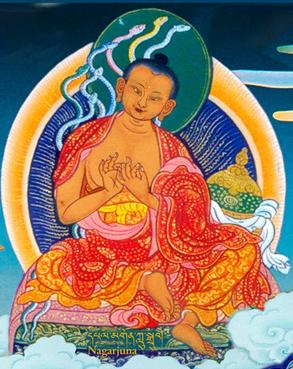
XXIII.1.
Because they come into existence presupposing errors as to what is salutary and un-salutary.
XXIII.2.
Do not exist by their own nature (svabhava); therefore the impurities (klesa) do not exist in reality.
XXIII.3.
Without that individual self, how can the existence or non-existence of the impurities be proved?
XXIII.4.
Is it not so that without someone the impurities do not exist of anybody?
XXIII.5.
In reference to the view of having a body of one’s own, that which is made impure does not exist in the impurities according to the five-fold manner.
XXIII.6.
Depending on which errors as to what is salutary and non-salutary are then impurities?
XXIII.7.
Substance (vastu) of desire, hate, and delusion is imagined.
XXIII.8.
Merely the form of a fairy castle, like a mirage, a dream.
XXIII.9.
In a formation of a magical man, or in things like a reflection?
XXIII.10.
And in turn depending on which, there is a salutary thing; therefore, a salutary thing does not obtain.
XXIII.11.
And in turn depending on which, there is a non-salutary thing; therefore a non-salutary thing does not obtain.
XXIII.12.
If “what is salutary” does not exist, how will there be desire for it?
And if “what is non-salutary” does not exist, how will there be hatred for it?
XXIII.13.
How can this notion be in error since “what is impermanent” does not exist in emptiness?
XXIII.14.
Is not then the notion concerning emptiness, i.e., that it is impermanent, in error?
XXIII.15.
All have ceased; therefore, the notion does not exist.
XXIII.16.
Whose is the error? Whose is the non-error?
XXIII.17.
Nor do errors of someone who has not erred come into existence.
XXIII.18.
Now you examine of whom do errors really come into existence!
XXIII.19.
And if errors are not originated, how can there be someone involved in error?
XXIII.20.
Nor by itself and something different at the same time, how can there be someone involved in error?
XXIII.21.
Then the individual self, “what is pure,” “what is eternal,” and happiness are not errors.
XXIII.22.
Then non-individual self, “what is impure,” “what is impermanent” and sorrow (dukkha) do not exist.
XXIII.23.
When ignorance has ceased, conditioning forces (samskara) and everything else cease.
XXIII.24.
How in all the world would they be eliminated? Who can eliminate that which is self-existent?
XXIII.25.
How in all the world would they be eliminated? Who can eliminate that which is non-self-existent?
Source: Orientalia




